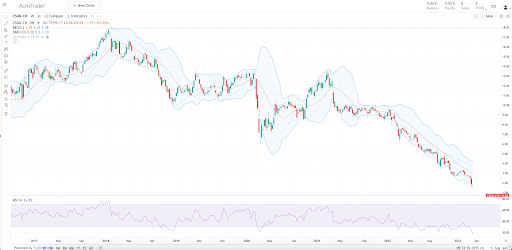Quite a lot of news broke last week, much of which influenced the value of the Forex pair EUR/CHF, such as the European Central Bank’s (ECB) monetary policy decision, the Credit Suisse saga, as well as worries about the strength of the global financial system.
Rising interest rates around the world have indeed increased borrowing costs, which have led to unprecedented bank collapses and bank runs, as the recent news has shown regarding Silicon Valley Bank, Silvergate, Signature Bank, First Republic Bank in the United States, and Credit Suisse in Switzerland.
And things are far from over this week, with the fate of Credit Suisse currently being discussed, and the Swiss National Bank’s (SNB) monetary policy meeting next Thursday (the 23rd of March).
Credit Suisse rescued by UBS
As major actors of the financial sector are working hard to restore confidence in the Swiss bank and in the sector overall, UBS has said that it requires the Swiss government to provide insurance if it were to buy Credit Suisse, thereby halting the banking crisis.
While the information was first about a buying price of around $6 billion, UBS has agreed to buy Credit Suisse this weekend for $3.25 billion (3 billion CHF), or around 60% less than what the bank was worth at the close of last week.
At the European opening, Credit Suisse’s shares opened down more than 60% at 0.67.
Moreover, 5 central banks have announced yesterday a common action to improve the availability of liquidity through the standing U.S. dollar liquidity swap line arrangements (the Bank of Canada, the Bank of England, the Bank of Japan, the European Central Bank, the Federal Reserve, and the Swiss National Bank).
As explained by the “the network of swap lines among these central banks is a set of available standing facilities and serves as an important liquidity backstop to ease strains in global funding markets, thereby helping to mitigate the effects of such strains on the supply of credit to households and businesses.”
Will the Swiss National Bank continue increasing its interest rates despite market turmoil and global bank chaos as the ECB did?
Despite the recent distress in the banking industry, the ECB agreed last Thursday to increase its 3 main interest rates by a further 50 basis points (its 6th consecutive rate hike), but its members also explained that they were prepared to provide liquidity to banks if it becomes necessary to do so after recent market turmoil surrounding bank runs, bankruptcy and bailouts of major banks in the United States and Europe.
As inflation in the Eurozone area continues to hover much higher than the 2% level targeted by the ECB (the headline inflation in February reached 8.5%, after 8.6% in January), the European Committee has been sending signals for some weeks that it would be hiking rates again at its meeting in March to combat inflation.
The most important factor seems now to be how the ECB will react to currency turmoil in the banking sector. While the European Central Bank is also data-dependant on making its decisions (especially about how inflation and growth figures evolve), it also has to take into account how markets develop, if the panic surrounding the banking and financial sector will spread and its impact on growth prospects, as the outlook has now become more uncertain. Still, two members of the ECB (Kazimir and Simkus) recently declared that this hike wasn’t likely to be the last one, as inflation is still too high.
Last Friday, the European Central Bank supervisors met to share their views on the current banking sector turmoil and declared that they saw no contagion to banks and financial institutions in the EuroZone.
But the outcome of the current Credit Suisse discussions could perhaps change the situation and influence the SNB not to raise interest rates at a time of such high uncertainty about one of its biggest financial institutions.
The EUR/CHF is close to parity
After losing 1.54% in the first week of March, the EUR/CHF currency pair was up 0.75% last week at 0.98728, mostly due to the ECB’s decision, which had supported the single currency, and worries about Credit Suisse that weighed on the Swiss Franc.
According to the ActivTrades’ market sentiment indicator, traders are mostly bullish on the pair, as 89% of all ActivTrades’ traders are buying the currency pair and 11% only are selling it.
The pair will still have to face an eventful week. First, market participants are still in risk-off mode and waiting to see how the quick Credit Suisse deal will potentially impact the banking sector to know if the turmoil in the financial sector will soon be over.
Secondly, many key events and central bank meetings will be held later, with the Fed on Wednesday and the SNB and the Bank of England on Thursday.
So, what do you think the next move for the EUR/CHF will be?
All information has been prepared by ActivTrades (“AT”). The information does not contain a record of AT’s prices, or an offer of or solicitation for a transaction in any financial instrument. No representation or warranty is given as to the accuracy or completeness of this information. Any material provided does not have regard to the specific investment objective and financial situation of any person who may receive it. Past performance is not a reliable indicator of future performance. AT provides an execution-only service. Consequently, any person acting on the information provided does so at their own risk.











